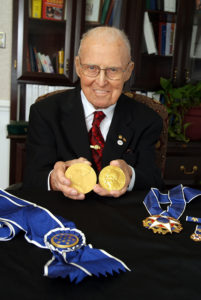March 25, 1914 – Sept. 12, 2009

Biography: Known as the Father of the Green Revolution, Norman Ernest Borlaug was born in 1914 on a farm near Cresco, Iowa. After completing his early education in his hometown, he studied forestry and plant pathology at the University of Minnesota, where he earned his bachelor’s and master’s degrees and completed his doctorate in 1942. After two years as a microbiologist with the DuPont de Nemours Foundation, he took on the challenge of leading the wheat improvement efforts of the Cooperative Mexican Agricultural Program, sponsored by the Mexican government and the Rockefeller Foundation.

In Mexico, Dr. Borlaug’s scientific knowledge was expressed in a humanitarian mission: developing improved grain varieties to feed the hungry people of the world. A practical, energetic, hands-on researcher, Dr. Borlaug worked in the fields alongside farm workers, students, and interns, sharing his knowledge as well as the labor of producing food crops. During his twenty years in Mexico Dr. Borlaug and his colleagues perfected a dwarf wheat variety that could produce large amounts of grain, resist diseases, and resist lodging – the bending and breaking of the stalk that often occurs in high-yielding grains. Under Dr. Borlaug’s guidance, this new wheat was planted with great success, not only in Mexico, but also in India and Pakistan. In subsequent years, the wheat was planted in nations in Central and South America, the Middle East, Africa, and Eurasia.
In 1964, Dr. Borlaug was appointed director at the Wheat Research and Production Program at the International Maize and Wheat Improvement Center (CIMMYT) near Mexico City. This position allowed him to expand his teaching mission. He shared his immense knowledge of research and production methods with thousands of young scientists from all over the world, “seeding” agricultural production in their home countries with new ideas and new productivity.
Despite receiving the Nobel Peace Prize in 1970 – and, over the years, multitudinous honors and recognitions from universities, governments, and organizations worldwide, – Dr. Borlaug remained a deeply humble and practical man who was as productive after winning this major honor as he was before.

He came to Texas A&M University in 1984 as a Distinguished Professor of International Agriculture and continued to teaching and inspiring young scientists at Texas A&M and CIMMYT. Hailed as having saved more lives than anyone else in the history of mankind, Dr. Borlaug cited one of his most prized tributes, the naming of a street in his honor in Ciudad Obregon, Sonora, Mexico – the site of some of his earliest research projects.
Dr. Norman Ernest Borlaug died at 95 on September 12, 2009. His legacy lives on in the work being conducted at Texas A&M University, CIMMYT, and by farmers around the world who benefited from Dr. Borlaug’s dedication and personal sacrifice in the pursuit of scientific knowledge.

